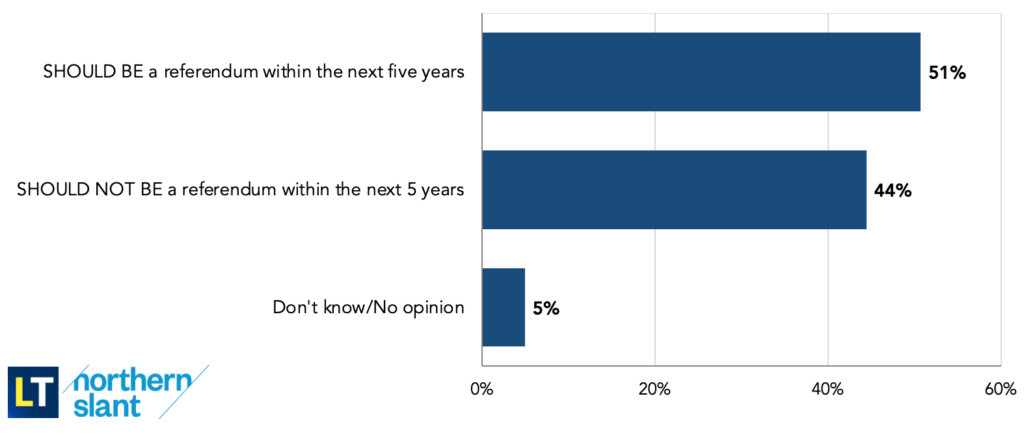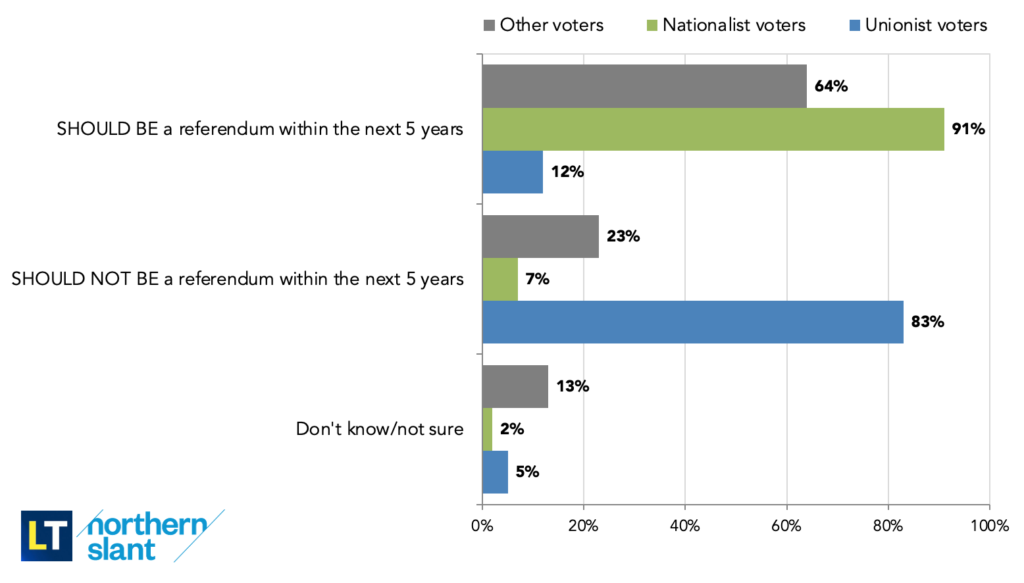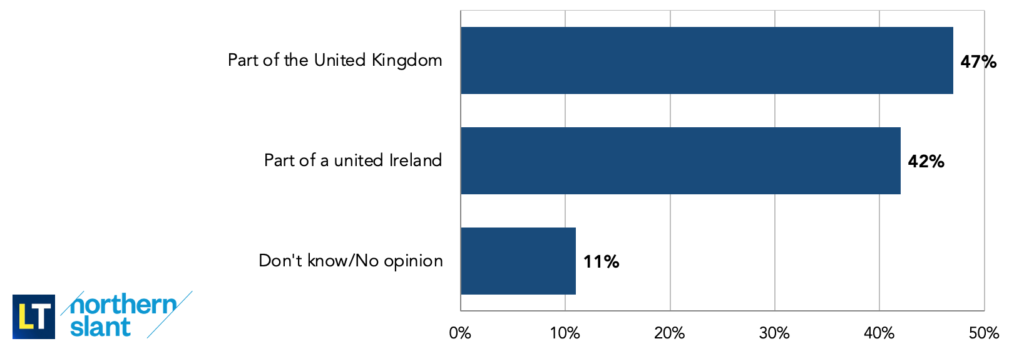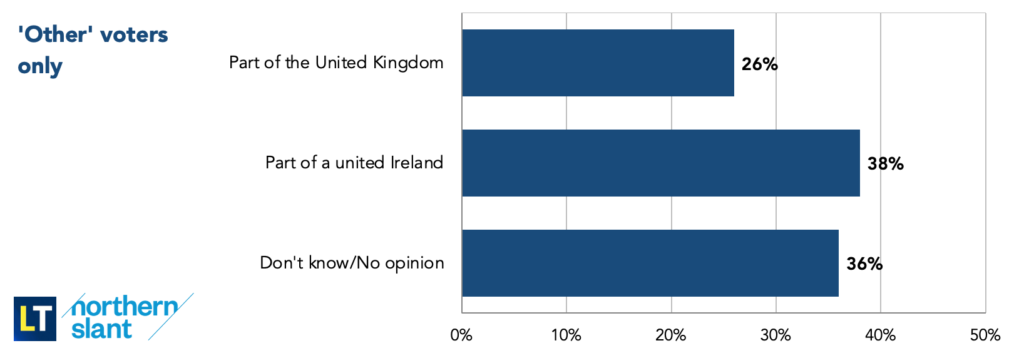There is considerable appetite for holding a referendum on Northern Ireland’s constitutional status within the next five years. According to the latest poll conducted by LucidTalk, 51% of respondents said there should be one; 44% said there should not be one, with a further 5% undecided. This might well indicate that a majority of the public is in favour of holding a referendum within the next five years, but given the poll’s 2.3 point margin of error, the level of support may be just below 50%.

Still, a majority or not, many people clearly agree with the idea of having a referendum in the near future – and this finding is not out of the blue. A LucidTalk poll from October 2017 found a similar level of support (52%) for holding a referendum within at least the next ten years (the response categories were slightly different in that particular survey).
According to the latest poll, support for holding a referendum within the next five years is –unsurprisingly – highest among nationalist and republican voters (91%). What is perhaps more striking is that about one in eight unionist voters said they would favour holding a referendum within the next five years, with a further 5% undecided.

With former DUP leader Peter Robinson calling on unionists to prepare for a referendum, joined more recently by East Belfast MP Gavin Robinson, it is possible that some unionists would welcome a referendum as a way of “resolving” the debate, presumably in the expectation that Northern Ireland’s place in the UK would be consolidated.
The Good Friday Agreement does give the Secretary of State the power to call a referendum at any time (provided one has not been held within the last seven years). But he or she is only required to hold one if it appears to him or her “likely” that “a majority of those voting would express a wish that Northern Ireland should cease to be part of the United Kingdom and form part of a united Ireland.”
In short, while the level of public support for holding a referendum is clearly a relevant part of the picture, the level of support for changing Northern Ireland’s constitutional status is of primary interest.
How would people vote?
All polls come with the caveat that they offer a snapshot of public opinion as it currently stands. They are not necessarily forecasts of the future. But, given the provisions of the Good Friday Agreement, they provide us with an important way of helping to establish if and when the Secretary of State is obliged to call a referendum.
The latest evidence does not indicate that the threshold of the Agreement has been met. If a referendum were held tomorrow, 42% of respondents in the LucidTalk poll said they would vote for Northern Ireland to leave the UK and be part of a united Ireland. A higher percentage, 47%, said they would vote for Northern Ireland to remain part of the UK. This level of support in favour of the status quo is broadly in line with other polls from recent years, both those conducted online and those conducted using face-to-face interviews.

However, it is far from a ringing endorsement for maintaining the union. Not only is support for staying in the UK less than 50%, but it’s not much higher than the level of support for a united Ireland. In fact, if we remind ourselves of the poll’s margin of error of 2.3 percentage points, the estimated range of support for staying in the UK is between 44.5% and 49.1%, while the estimated range of support for a united Ireland is between 42.3% and 44.6%. In other words, the two ranges of support overlap, if ever so slightly.
Not all polls have found support for a united Ireland to come this close to the level of support for Northern Ireland remaining in the UK. In a 2019 study by the University of Liverpool, 29% of respondents said they would vote for constitutional change. In the most recent Northern Ireland Life and Times Survey, 25% said they would do so.
One possible reason for these lower levels of support for Irish unity may reflect the face-to-face methodology of these surveys. This may lead some “shy” respondents who are in favour of a united Ireland to express a “don’t know” opinion, who are otherwise detected through LucidTalk’s online methodology. A further explanation for the variation, as Professor Jon Tonge notes, is the opt-in nature of LucidTalk’s online panel, which is likely to attract more politically engaged respondents with stronger views on the constitutional question.
Room for persuasion
Regardless of where we look, it is clear that there is a key group of voters who will be open to persuasion in any future referendum. In the most recent Life and Times Survey, nearly 40% of respondents said they identified as neither unionist nor nationalist. Many of them do not vote in Assembly or Westminster elections, in which turnout has been as low as 55% and as high as 66% over the last decade.
In contrast, if we look at the 85% level of turnout recorded in Scotland’s 2014 independence referendum, we can expect that many traditional non-voters will participate in a referendum that decides something as fundamental as Northern Ireland’s constitutional future.
And among those who have voted in recent elections, we know that a higher share of votes is going to ‘other’ parties. As the latest LucidTalk poll shows, many of these voters are undecided as to how they would vote in a constitutional referendum. While only 11% of all respondents in the poll said they “don’t know” how they would vote, this increased to 36% among Alliance, Green Party and People Before Profit voters.

So, overall, what can we tell from the latest LucidTalk poll? In summary, it tells us that a large portion of the public, if not clearly a majority, supports holding a referendum in the very near future – and likely for different reasons. It also tells us that, in line with broader evidence, it is not currently “likely” that a majority exists in favour of constitutional change even if a referendum were to be held. However, in the absence of resounding support for the status quo either, it is clear that non-voters, undecideds, and those who identify as neither nationalist nor unionist will be pivotal to any referendum outcome.
With this in mind, there’s one final point worth considering for now. From the poll, we do see evidence of at least one decisive majority: the 57% who think that Northern Ireland will be economically worse off from the UK’s departure from the EU, compared to just 20% who think it will be better off. Just as Brexit has helped to galvanise this renewed debate on Northern Ireland’s constitutional future, it’s fair to expect that its effects will continue to shape public opinion in a significant way over the years to come.
Methodology, and more on LucidTalk
Polling was carried out by Belfast based polling and market research company LucidTalk. The project was carried out online from 15th to 18th January 2021. The project targeted the established LucidTalk NI-Wide Opinion Panel (13,376 members) which is balanced by gender, age-group, area of residence, and community background, in order to be demographically representative of Northern Ireland (NI). 2,390 full responses were considered in terms of the final results, after a data auditing process ensured all completed poll-surveys were genuine ‘one-person, one-vote’ responses, and the base data-results were weighted to 17 NI demographics, to ensure a robust NI representative sample of opinion. This final 2,390 response dataset is a demographically representative sample of Northern Ireland – producing results representative of NI Opinion to within an error of +/-2.3% at 95% confidence. See full results for more information regarding project methodology.
Also published on Medium.
